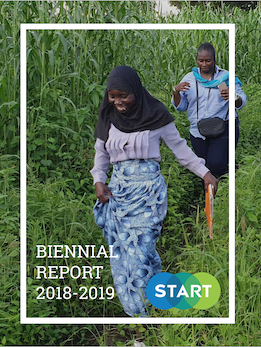“With this 2018-19 biennial report, I am pleased to share news of START’s progress in supporting the work of African and Asian researchers in informing critical societal challenges of adapting to climate change, creating more sustainable cities, reducing risks and impacts of natural disasters, and increasing access to clean, renewable energy.
Over this two-year period, two major consortia efforts in Africa came to a successful conclusion: the Adaptation at Scale in Semi-Arid Regions, which advanced understanding of adaptation through the lenses of gender, ecosystem services and governance, and the Future Resilience for African Cities and Lands, which examined how climate information can more effectively inform decision making in Southern African cities that are facing significant water and energy security challenges.
In Asia, START convened a second round of its Pan-Asian Risk Reduction Fellowship Program, which provided learning opportunities on integrated disaster risk reduction for early career professionals from research, policy and action domains.
During the 2018-19 period, START also engaged teams of researchers, government renewable energy experts, and NGOs to examine how to more effectively expand access to small-scale renewable energy in West Africa. Also in 2018-19, START continued its long-term partnership with the NASA Global Observation of Forest Cover and Land Dynamics program, which expands skills and access to state-of-the-art remote sensing tools to inform research on land-cover change in Africa, Asia, Latin America and the Mediterranean.
We are grateful for the support we received during this period from the US Global Change Research Program, the National Science Foundation of the US, and NASA, the International Development Research Centre of Canada and the Research Fund of Quebec, the Department for International Development and the Natural Environment Research Council of the UK, and others. We are also grateful for our strong partnerships with numerous universities, research centers, NGOs and government agencies in carrying out this work.”
Jon Padgham, START’s Executive Director



